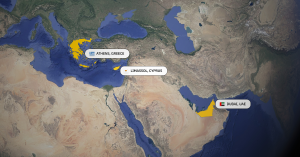In the past week, in response to the Russian invasion of Ukraine, many businesses around the world got “political”.
Oil giants like BP and Shell abandoned their stakes in Russian joint ventures and state gas projects in response to Putin’s aggression. Tech giants like Google, Meta, and Microsoft prevented Russian state media from monetizing on their platforms, disabled live traffic data from Ukraine to help the safety of Ukrainians on the ground, and protected Ukraine from Russian cyberattacks. The tech entrepreneur Elon Musk provided its Starlink satellite internet to the Ukrainian government.
Telecommunication companies and communications apps, like Rakuten Viber, for example, have launched free minutes for calls to all telephones in Ukraine so that people could connect with their loved ones in the war zone, even if they did not have Viber or the Internet. Rakuten’s CEO, Japanese billionaire Hiroshi Mikitani, has donated almost €8M to the Ukrainian government for humanitarian assistance.
“It’s not just a matter of business to take a stance, it’s our human responsibility to react.
Since the beginning, we have been committed to giving 1% of our turnover to sustainable and environmental projects. For 2021, we have almost €8K ready. However, none of this will matter if there is no peace. Therefore, we have decided to immediately send half of this amount to the SOS Ukraine account of Czech nonprofitable organization People in Need,” Lukáš Janoušek, Founder and CEO of Campiri, the recreational vehicles rental platform, shared with The Recursive.
These are just a few examples, as large and small businesses from various industries around the world express their solidarity with Ukraine at an unprecedented volume.
Many companies from our region have taken an active stance by helping their teams or Ukrainian refugees out of the military zone and into the safety of neighboring countries, like Poland, Romania, Moldova, Hungary, and Slovakia. Tech communities in the region have organized various tools for donation, logistical, humanitarian, and cyber support of Ukrainians.
The Recursive talked to some of these companies about why they felt important to get active, as the concept of social responsibility of businesses is moving into uncharted new territory. You will also read advice from a communication expert on how business owners should adjust their communication to reflect the changed context.
Communicating your support for peace
Romanian Alina Vandenberghe, co-founder and CXO of US-based Chili Piper, offering scheduling software for B2B revenue teams, shares that although corporate responsibility is tricky in political landscapes, which might appear dividing, in this case, the narrative is clear.
“Company leaders can’t just talk about it. They need to show their support for peace to make sure their employees feel safe,” shared Alina Vandenberghe, co-founder of Chili Piper.
The Chili Piper team, which has members working remotely from over 20 countries like America, Romania, Ukraine and Russia, has been outspoken on social media with initiatives of trying to help employees in the region, as well as their families and friends.
Alina shared that they launched a petition to create humanitarian corridors in Ukraine for the UN and Red Cross teams to get inside the country safely. They have been distributing a document with various border crossing times, buses from Ukraine, and shelters in the neighboring countries for refugees, mainly women and children, who are free to leave the country. They are also raising funds from the tech ecosystem players. When the UN and the Red Cross have their operations ready locally, then they will direct the funds towards them.
The mobility of communication
Joanna Manarczyk, PR Manager in CEE at Bolt, the Estonian mobility company present almost everywhere in the world, shared that they have made important changes to their operations. They are in constant contact with their Ukrainian team and have provided the option of remote work from in or outside of Ukraine to more than 100 employees in the country, while also allocating a relocation budget to each of them.
They have removed all the Russian products or products associated with Russian companies from the Bolt Market, their grocery delivery service. The company has also suspended its operations in Belarus because of their government’s controversial support of Putin’s military invasion.
They are donating 5% of every order in Europe, for the next two weeks effective immediately, to NGOs supporting Ukraine and its people, including the Red Cross. Their goal is to donate €5M as part of this initiative and they have already transferred the first €1M.
“We continue to do our best to keep our services in Ukraine functioning to assist with movement in these difficult times. We reduced the commission for all our services in Ukraine to zero. In neighboring countries, we have incentivized our drivers to accept rides on the Ukrainian border to transport Ukrainians to safe destinations. We hope all Bolt employees, our tens of thousands of drivers, couriers, and restaurant partners, and all those in Ukraine remain safe,” Joanna Manarczyk says.
Stronger through constant communication
Toni Iafrate, Chief Communication Officer at UiPath, the RPA company with HQs in neighboring Romania and a local team in Ukraine, shared that they have launched a Solidarity Fund for Ukraine in partnership with the UiPath Foundation. With this, their focus is to aid over 400K children across Ukraine affected by the war, as well as help relocate their families to Romania.
“Over the past several years, we have seen the solidarity of UiPath colleagues, our customers, and our partners across the globe. And it’s time again to mobilize a humanitarian response to the tragedy that is unfolding before our eyes,” Toni Iafrate, CCO at UiPath, shares on behalf of the company.
UiPath is in constant contact with their local team and is aiding those that want to relocate as well as those that have chosen to stay. They have developed special workstreams to support all the team members, customers, and partners during this unpredictable time. Their goal is to collaborate as a united front to ensure consistent communication on key topics.
They also encourage employees to address their mental health needs by offering tools like HeadSpace and Modern Health. Toni Iafrate shared that this step is important so people will feel comfortable reaching out, instead of bottling up emotions until reaching a breaking point.
Changing online communication during a crisis
Alexandru Negrea, a digital marketing and communication consultant, says that on social media, all brands need to adapt to this context. He shared with us three directions that companies should take into consideration:
- When something important happens in the lives of your consumers, you need communication people who can adapt quickly and understand that (almost) no one is interested in your services and products, especially if they fall into the “nice to have” category.
“You will have to shift the focus from product/service to brand, and the brand will be involved, with all the resources at its disposal, in solving those problems,” Alexandru Negrea, co-founder of Saga Space, a place developed for recording webinars, podcasts, or other live events, shares.
- The tone of communication in such a difficult time can only be pragmatic and authentic, based on action and what needs to be done at the moment. So, we give up, as much as possible, the idealistic and/or aspirational communication used normally in commercials.
- In times of crisis, decisions of serious involvement are made quickly or not at all. If you want to organize help for refugees now, you need a clear mind to make the decision now to open a dedicated phone line and a quick implementation of all the necessary procedures in this context. But now, not in two weeks.
>>> Read more about the tech communities in the region in support of people in Ukraine <<<







